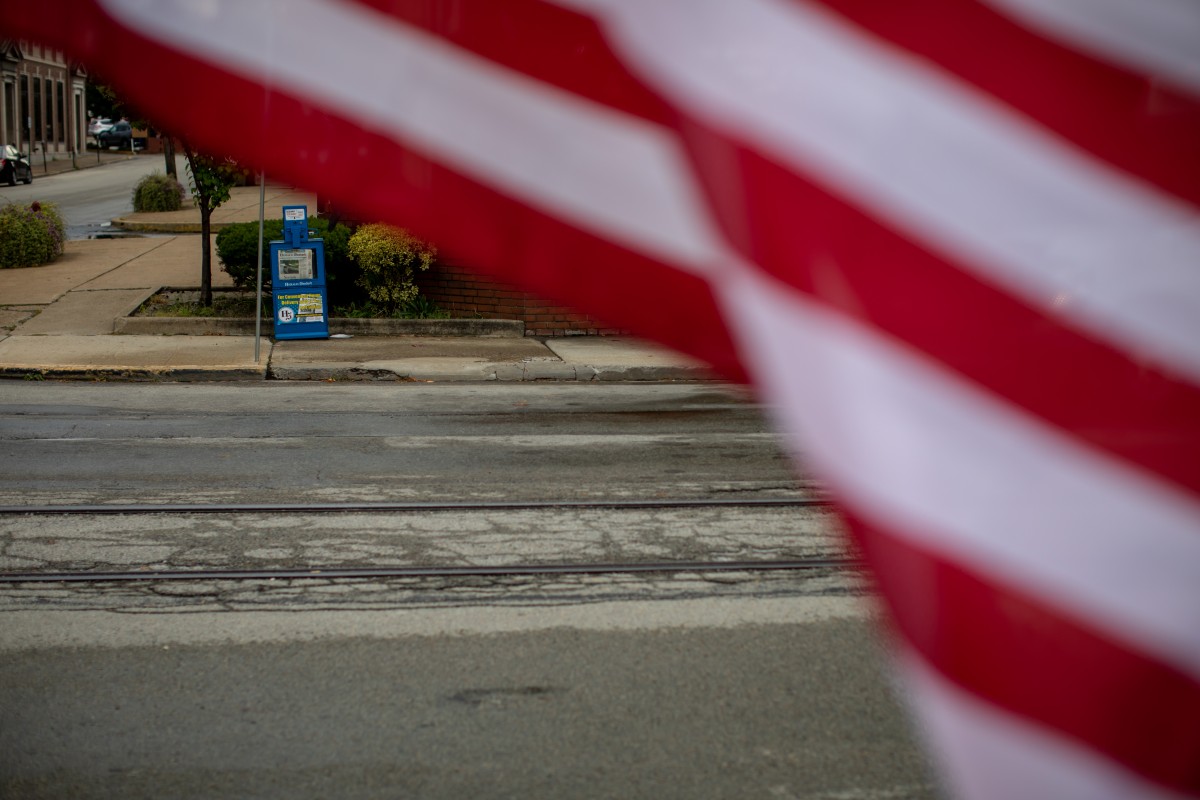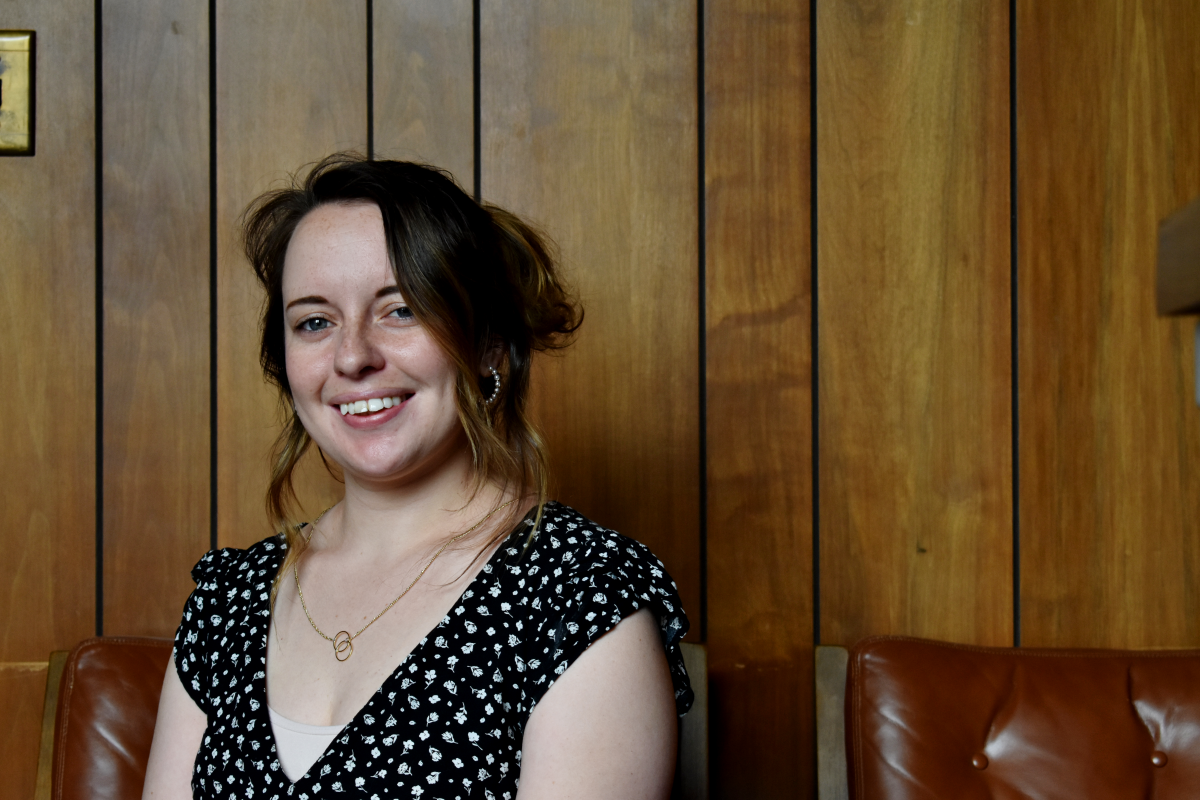Ashley M. Jones is attempting to change the way the Alabama literary scene is perceived from the inside and out. Jones was recently named Alabama’s Poet Laureate and is the first person of color and the youngest person to hold the position since it was created 91 years ago.
“I’m really excited to be the representative for a state which is so often misunderstood or misrepresented,” Jones says. “People sometimes think that we are very monolithic in our beliefs here in Alabama, and that’s not true. So for me to have been chosen, and to be so openly political, I think that really means a lot.”
Jones was named to the position in early September and says her goals are to travel the state to connect communities across Alabama while also creating spaces for people to both read and write poetry.
Jones’s own poetry journey began at age seven, when she memorized the poem “Harriet Tubman” for a class assignment. Written by Eloise Greenfield in “Honey, I Love” – a book of poetry for children but that Jones says “anybody can get something out of” – Jones recalls dressing up as Tubman and reciting the words for her classmates.
“I just felt this incredible power. I felt that my voice had a meaning finally. I felt like what I said meant something,” Jones says. “I had this little composition notebook that I would write observations about my family, like the little creepy writer that I was. I started to write poems in that book, and I’ve been doing that ever since.”
She continued to soak up and study poems of Black writers, such as Gwendolyn Brooks and Lucille Clifton throughout her education. Reading a poem or a novel about a Black person by a Black person, Jones says, made her feel she could tell her own story, too – representation mattered to her.
Jone released her first poetry collection, “Magic City Gospel,” in 2017, shortly after completing her master’s of fine arts in poetry from Florida International University. The poetry in it was inspired by a trip to the West Coast that Jones says allowed her the space to miss her Alabama home – the sights and sounds, but mostly the people.
“I was sort of forced to begin writing about my home and writing more authentically as myself because I didn’t have the home around me to fill that void,” Jones says. “So, I always tell people I was sort of writing my way back to Alabama.”
Jones did return to Birmingham where she began teaching at Alabama School of Fine Arts, a private high school for students pursuing creative arts. She poured herself into the community and founded the Magic City Poetry Festival, a community celebration focused on local poetry, history and culture in Birmingham.
As she continued teaching and writing, Jones also began finding her voice as an advocate. In the fall of 2018, she and a group of other poets worked through 100 Thousand Poets for Change to raise enough money to free someone from a detainment center in Etowah County, proving to her that poetry is tangible and powerful, a vehicle for change.
Jone’s second book of poems, “dark // thing,” published in 2019, is an extension of that experience. It deals with her raw anger at the injustices experienced by Black people in the U.S. – throughout history and in the heightened tension during the Donald Trump administration.
That was followed by her latest work “Reparations Now!” which continues to explore racial inequity and racism.
The title of the book, Jones explains, was her response to Governor George Wallace’s 1963 inauguration speech, in which he proclaimed “‘Segregation today! Segregation tomorrow! Segregation forever!”
“I always had the idea that we haven’t actually made all this progress that we say we have, but seeing it written in black and white, how much everything is the same,” Jones says of Wallace’s speech, “I wanted to write this piece and I wanted to riff off of ‘Segregation today! Segregation tomorrow!’ So I changed segregation to reparations – the flip side of segregation is not necessarily reparations, but you see where I’m going here. Some of the sections are from his words and then some are my own words.”
“Reparations Now!” contains sonnets, golden shovels, prose poetry, concrete poetry, found poems and all forms in between. Some poems fill the whole page with swaths of text, while others sliver down the edge of a page and onto another.
While the collection includes accounts and responses to horrific tragedies like the killings of Mary Turner, Stephon Clark, Breonna Taylor, Sandra Bland and Oluwatoyin Salau, Jones also drapes the reader in Black joy through accounts of her family and friends. The collection forces the reader to acknowledge the hard truths of society, while also anchoring the reader in hymns of resilience and love.
“This book, I feel like I wrote with multiple emotions, like it wasn’t just fueled by frustration and wasn’t just fueled by love; it wasn’t just fueled by curiosity,” Jones says. “It was just writing whatever was on my mind and not over scrutinizing it. Exploring form, exploring topics that I maybe hadn’t before. And I just think my voice is more sure.”
The book opens with an acrostic poem, a form where the first letter of each line spells a word. Some poets consider acrostic poems to be simple, but Jones was inspired to explore the style after a conversation with the poet Faisal Mohyuddin, who she interviewed for The Poetry Magazine Podcast. Jones has mastered the use of form by not allowing it to measure her or hold her back, but instead using it as a tool to better express herself.
“Growing up, I hated form so, so much. I always joke that I would evangelize against form,” Jones says. “My last year of graduate school something just opened for me. The way I was taught about form, it wasn’t this weird hierarchical thing, it was, ‘Here’s another way to write poetry; here’s the history of it; here’s where we stand in that timeline; here’s how you can do it for yourself; here are some poets who are alive today, doing things with this form, making it interesting.’”
“That kind of helped me understand what I could do on the page,” she says. “If my writing is an instrument, I want to play all the instruments. I want to know all the forms, do all the genres, because that’s the gift I was given, I want to play with it. I want to explore.”
Jones included several pieces in “Reparations Now!” about her father, Donald Lewis Jones, who passed away in April 2021. In the poems, phrases like, “Even the sunrise I hold with his eyes” and “the earth speaks back to him/ as he feeds it,” characterizes her father and her family’s love for him.
She says it was important for her to give her father the gift of poetry when he was still alive.
“That is why I say poems can change everybody’s lives. They are so powerful,” Jones says. “[Poetry is] not for all the degrees and all that, it’s for the communion of souls. That is what it’s for – the communication between humans or anything else that will listen.”
Ash Tippit writes young adult/children’s literature and poetry. She is currently an Adjunct Instructor at the University of Alabama at Birmingham and the Managing Editor/Social Media Coordinator of Nelle Literary Journal. Ash’s research interests include gender and sexuality studies, mental health, Marxist literary theory, ethnic studies, and environmentalism. Her published works include the poems “Science Class” and “Her Frozen Chicken Thighs Remain” and “To Be a Dragon in 2020,” as well as her essay “On Oxygen.”



